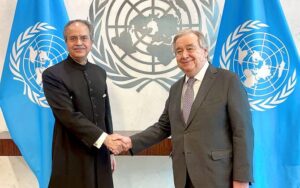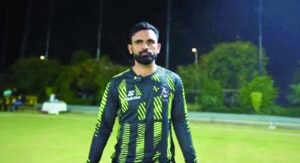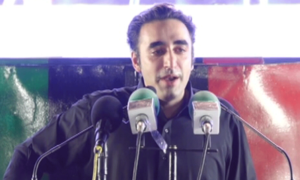• Bilawal says PPP is against concept of military courts
• Calls for passage of constitutional amendment before Oct 25
ISLAMABAD: PPP Chairman Bilawal Bhutto-Zardari on Wednesday cautioned that any delay beyond Oct 25 in getting the 26th constitutional amendment passed would lead to a face-off between institutions, leaving parliament at the losing end.
Mr Bhutto-Zardari stated this while giving reasons why he was racing against time to carry through the constitutional amendment that envisages the setting up of a Federal Constitutional Court (FCC).
During an informal chat with a group of reporters covering the Supreme Court proceedings at Zardari House, he pointed out that the biggest indicator for his apprehension was the announcement of the Sept 14 clarification order where the Supreme Court had reprimanded the Election Commission of Pakistan for not implementing its July 12 judgement in the reserved seat case.
PPP Vice President Sherry Rehman and the chairman’s spokesperson Murtaza Wahab were also present.
The chairman, who seemed bitter with the past overreach of the judiciary, said he was aggressively pursuing the amendment before Oct 25 since it was an unfinished agenda of the Charter of Democracy.
Besides, he added, setting up the FCC and bringing judicial reforms were part of the PPP’s manifesto. “Or there will be a status quo leaving us to face similar hurdles we endured at the time of the passing the 18th and 19th Amendments,” he emphasised.
On Oct 25, incumbent Chief Justice of Pakistan Qazi Faez Isa will doff his robes after which senior puisne judge Justice Syed Mansoor Ali Shah will assume the office.
The failure to establish the FCC will put the entire parliamentary system at the receiving end, the consequence of which will come in the shape of a conflict between the judiciary and establishment, Mr Bhutto-Zardari said. “This fight is for the supremacy of parliament, or the judiciary will again interfere in the affairs of parliament,” he feared.
Imran’s military trial
When asked about his opinion on PTI founder Imran Khan being tried in military courts, Mr Bhutto-Zardari posed a counter question by asking “Why”, also reminding that “the ultimate power to pardon is with us”. He was apparently alluding to the presidential power to pardon capital punishments.
On hectic consultations done between different political parties at Parliament House on Sept 15 (Sunday), he said when the judgement could come on Saturday evening why not the amendment be passed on Sunday night.
But he hastened to add that he would like do it (passage of the constitutional package) in the full light of the day and will pursue it aggressively, adding that the court was exercising too much power and they had only intended to balance out the power through the FCC — court which could even initiate contempt proceedings on behalf of the apex court or other court in case of scandalising.
“Though we addressed a number of fault lines by passing the 18th Amendment, like we broke the cycle of active military coups, ensured provincial autonomy, settled the appointment of the chief election commissioner or the interim government, we could not achieve the objective of FCC and judicial reforms,” he pointed out.
About the appointment of judges to the FCC, he explained that the initial appointment of FCC judges was necessary so that a robust legal foundation be laid ensuring separation of powers on a strong footing.
“Already we have undermined the concept of Council of Common Interests,” he said, adding that the real purpose was to give equal representation to all the provinces to filter out judges like Gulzar Ahmed or the judges having Iftikhar Muhammad Chaudhry-like mindset.
“In principle, it is not the job of the judiciary to appoint judges,” he said, adding that no one ever objected when the Senate was created over the National Assembly. “Then why the objection to the FCC if set up on top of the Supreme Court?”
During the judicial history, the Supreme Court has acted on top of elected governments and acted like prime minister on top of elected prime ministers, he regretted.
When asked why FCC was being constituted when the same Supreme Court had maintained the sentence of former dictator Pervez Musharraf under high treason, Mr Bhutto-Zardari reminded that it was not the Supreme Court’s credit but of the late Justice Waqar Seth of the special court.
Polarisation
To a question about growing polarisation in society, the PPP chief said when events like May 9 took place and when acts of vandalism happened even in holy places, the other side considered now it was the time that “either you are with them or with us”.
“We have to break this fever, but unfortunately Imran Khan has shown that he has no capacity to develop consensus among political parties,” he said.
About the setting up of military courts, Mr Bhutto-Zardari said he did not want to pollute the entire legislation with other proposals, adding that his party was against the concept of military courts. He said he had shared the draft of the constitutional package with JUI-F emir Maulana Fazlur Rehman, who was not a difficult or a rigid man and understood the sensitivity and the reasons of these amendments.
Published in Dawn, October 3rd, 2024











